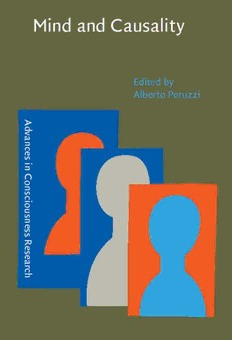
Mind and causality PDF
Preview Mind and causality
<DOCINFOAUTHOR""TITLE"MindandCausality"SUBJECT"AdvancesinConsciousnessResearch,Volume55"KEYWORDS""SIZEHEIGHT"220"WIDTH"150"VOFFSET"4"> MindandCausality AdvancesinConsciousnessResearch AdvancesinConsciousnessResearchprovidesaforumforscholarsfromdifferentscientific disciplinesandfieldsofknowledgewhostudyconsciousnessinitsmultifacetedaspects.Thus theSerieswillinclude(butnotbelimitedto)thevariousareasofcognitivescience,including cognitivepsychology,linguistics,brainscienceandphilosophy.TheorientationoftheSeries istowarddevelopingnewinterdisciplinaryandintegrativeapproachesfortheinvestigation, descriptionandtheoryofconsciousness,aswellasthepracticalconsequencesofthisresearch fortheindividualandsociety. SeriesA:TheoryandMethod.Contributionstothedevelopmentoftheoryandmethodin thestudyofconsciousness. Editor MaximI.Stamenov BulgarianAcademyofSciences EditorialBoard DavidChalmers EarlMacCormac UniversityofArizona DukeUniversity GordonG.Globus GeorgeMandler UniversityofCaliforniaatIrvine UniversityofCaliforniaatSanDiego RayJackendoff JohnR.Searle BrandeisUniversity UniversityofCaliforniaatBerkeley ChristofKoch PetraStoerig CaliforniaInstituteofTechnology UniversitätDüsseldorf StephenKosslyn †FranciscoVarela HarvardUniversity C.R.E.A.,EcolePolytechnique,Paris Volume55 MindandCausality EditedbyAlbertoPeruzzi Mind and Causality Editedby Alberto Peruzzi UniversityofFlorence JohnBenjaminsPublishingCompany Amsterdam(cid:1)/(cid:1)Philadelphia TM Thepaperusedinthispublicationmeetstheminimumrequirements 8 ofAmericanNationalStandardforInformationSciences–Permanence ofPaperforPrintedLibraryMaterials,ansiz39.48-1984. LibraryofCongressCataloging-in-PublicationData MindandCausality /editedbyAlbertoPeruzzi. p. cm.(AdvancesinConsciousnessResearch,issn1381–589X;v. 55) Includesbibliographicalreferencesandindexes. 1.Philosophyofmind-Congresses.2.Causation--Congresses.I. Peruzzi,Alberto.II.Series. BD418.3.M554 2004 128’.2-dc22 20003063801 isbn9027251894(Eur.)/1588114740(US)(Hb;alk.paper) isbn9027251908(Eur.)/1588114759(US)(Pb;alk.paper) ©2004–JohnBenjaminsB.V. Nopartofthisbookmaybereproducedinanyform,byprint,photoprint,microfilm,or anyothermeans,withoutwrittenpermissionfromthepublisher. JohnBenjaminsPublishingCo.·P.O.Box36224·1020meAmsterdam·TheNetherlands JohnBenjaminsNorthAmerica·P.O.Box27519·Philadelphiapa19118-0519·usa Table of contents Preface vii Chapter1 Causalityanddevelopment:Past,presentandfuture 1 BrianHopkins Chapter2 Perceptionofcausality:Adynamicalanalysis 19 RiccardoLuccioandDonataMilloni Chapter3 Embodimentandthephilosophyofmind 35 AndyClark Chapter4 Causesandmotivations:Merleau-Ponty’sphenomenologyconfronts psychologicalstudies 53 AntonellaLucarelli Chapter5 Mentalcausationandintentionalityinamindnaturalisingtheory 69 SandroNannini Chapter6 Theenviousfrog 97 MarcoSalucci Chapter7 Knowingwhatitislikeandknowinghow 119 LucaMalatesti Tableofcontents Chapter8 Humancognition:Anevolutionaryperspective 131 IanTattersall Chapter9 Space,timeandcognition:Fromthestandpointofmathematicsand naturalscience 149 FrancisBaillyandGiuseppeLongo Chapter10 Causalityinthetextureofmind 199 AlbertoPeruzzi Index 229 Preface The notion of causality has received the longstanding attention of scientists andphilosophers.Recentadvancesinthe neurosciencesandin thephysicsof “complex systems”, as well as in the philosophical perspective of “naturalisa- tion”ofknowledge,haveproducedsubtlebutrelevantchangesatthejuncture connectingthenotionofcausalitywiththatofthemind.Suchchangesaffectin apossiblydecisivewaythetraditionallandscapesofdeterminismversusinde- terminism,monismversusdualism,top-downversusbottom-uparchitecture, localversusholisticapproachandlinearversusnon-linearsystemdynamics. Asthediscussionofcausalityinthetheoriesofmindiscurrentlyundergo- ingrapidchanges,itisanappropriatetimetodiscussideasaboutthemeaning of such changes in recent theories in physics, biology and cognitive science. How do they affect the received view about cause-effect relationships and in particularwithregardtothestructure,thegenesisandthenatureof“minds”? The notion of causality has also received various interpretations in con- nection with phenomena of different kinds and scales. However, the central positionconcerningcausallinks,intheworld-viewofeithertheresearcheror thelayman,isnopreludeinacknowledginganydomain-specificrangeofva- liditytodifferentcharacterisationsofsuchlinks.Thusoneisledtoassumethat ifthereisroomforagivencausalthesis,suchasdeterminism,ortheprinciple of locality, or reduction of the whole to its parts, then it holds from top to bottom,i.e.,thesamethesisholdsforthearchitectureofanycomplexsystem. There are many scientific domains in which such assumption is under discussion. One of them is particularly interesting since there the notion of causalityisnotonlyatheoreticaltool,butalsoanobjectofinvestigation.The domaininquestionisthatofcognitivesciences. Contemporary theories of mind provide almost the whole range of atti- tudes towards causality (viz., in the sense assigned to causal explanation, the structureofanontologyofcausesandeffects,andthebehaviouralevidencefor them).Suchattitudespreviouslyshowedupinthecontextofnaturalsciences, butnowtheyconcerntheeffectivenessofthemind’spatternsand,ultimately, Preface the formation of the very idea of causality (e.g., in the context of cognitive development). Foralongtime,thediscussion onthe“foundations”ofthecognitivesci- ences has, almost exclusively, focused on the identity/analogy/difference be- tween informationprocessing modelsof progressivelymore complexsubsys- temsof the mind. The philosopherswho rejected anyand all such modelsas inherentlyinadequatewerenotlookingforothermodels,butratherseemedto becontentwitharguingthat,inrealorganisms,softwareandhardwareenter- tainmorethanacontingentcoexistence(contrarytothe“multiplerealisations” thesis of functionalism) and that the semantics(perhaps, eventhe syntax) of themind’ssoftwarecannotbedisjoinedfromitshardware. Overthelastdecadeorso,thesituationhaschanged.The“dynamicalsys- temsapproach”,despiteitslimitations,hasestablishedabridgewithboththe “perception-action” and with the “ecological” approaches. Manyeffortshave beenmadetolaythegroundforanintrinsicallycausaltheoryofmind,which means,firstofall,thatitscomplex,many-layered,architecturecanonlybeun- derstoodbytakingthe(biological)historyofthewholebodyintoaccountand bylookingatthespecificway(andtiming)itperformscertainfunctions. Developmentalpsychologytakesintoaccountthecausalsequencesthrough whichanycognitivecapacitymaturesandisstablyintegratedwithothercapac- ities. Evolutionary biology considers other kinds of causal sequences as does any other science involved in trying to understand the preconditions for the existence of minds. At issue is more than a difference in scale. It seems that differentpatternsofcausalityhavetobesimultaneouslyconsidered. Theclassicalandtheconnectionistmodelofmindmainlydifferin terms of the sort of causal architecture they posit. In contrast to both models, the dynamicalsystemsapproachseemstosupporttherejectionofanymind-body dualism. In both philosophy of mind and cognitive psychology, such models havebeeninterfacedwithontologicalandmethodologicaldebatesconcerning the identity thesis, the nature of qualia, the role gestalts have to be assigned andtherelationshipsbetweenperceptionandlanguage,tomentiononlyafew topics.Thisinterfaceislessarticulatedforthedynamicalsystemsapproach,but itsnaturalisticprofileismorerobust. Inordertoassesstheexactreasonsofreductionistversusemergentistview- points, it is useful that the different senses of “naturalism” can be clearly identified,aseachofthemisassociatedwithanemphasisonspecificdataand methods.Here,thecontributionofaprecisephilosophicalanalysisishelpful, eventhoughitsrigourisfarfromtheexperimentalandsimulativeanalysisof causalaspectsofmind. Preface Withinthestudyoflanguage,muchattentionhasbeenpaidtodetermine theimportofcausal“chains”infixingthereferenceforrelevantclassesofex- pressions. On a meta-theoretical level, a subject largely debated by analytic philosophersisthatofwhichexplanatorypotentialcausaltheoriesofreference canbesafelyassigned.Another,nolessdebated,issueconcernstheinterfacebe- tweenphysicalandmentalcausation.Dependingonwhichsolutionisadopted, the task of determining the exact role of biological constraints, in both the phylogenesisandontogenesisofmind,canbeaccomplishedindifferentways, whichhaveconsequencesevenforthenature/culturedichotomy. Ratherthanprovidingahistoricalreconstructionofthepathwaysthatcon- vergeintothepresent,multi-faceted,debateoncausality,thisbookfacessome ofthemainissuesintherecentliteratureconcerningcausalityandmind.The setofpaperscoversagoodpartofthespectrumofpresentmethodologicalper- spectivesandthusprovidesacollectivelycriticalsurveyofthestateoftheart. Eachpapersuggestsargumentsthatpointattheneedoftakingsimultaneously intoaccountvariousapproaches,inordertoidentifyandevaluatetheirpoints ofconvergenceanddivergence. The paper by Brian Hopkins (“Causality and development:Past, present andfuture”,pp.1–17)facesissuesabouttheontogenesisofmindandthemech- anismsthatcreatethechangesobserved.Thetaskofexplainingsuchchangesis problematic,largelybecauseofthenarrowviewsthathavebeenadoptedabout whatconstitutescausalityinadevelopmentalcontext.Infact,wehavenosat- isfactory theory that accounts for the mechanisms of developmentalchange, which most probablyoccur undercomplex non-linearregimes. After a short overview of the historical background of what constitutes causality in devel- opment,Hopkins suggeststhat dynamical systemsthinking can offergeneral guidelinesforovercomingthis problem.Illustrationsare givenfromspecula- tions about the link between prenatal and postnatal development and more particularlyfromthoseconcerningtheco-developmentofpostureandaction. Thechancesofferedbyadynamicalsystemsapproacharealsoexploredin RiccardoLuccioandDonataMilloni’scontribution(“Perceptionofcausality: Adynamicalanalysis”,pp.19–24).InordertovindicateAlbertMichotte’sargu- mentsinsupportofthethesisthatcausalitycanbedirectlyperceivedinmany situationsinthatitpresentsthecharactersofthe“encountered”(touseWol- gangMetzger’sterminology),LuccioandMilloniemphasizethatexperimental phenomenology,mainly in the vein of Gestalt psychology, has exhibited sev- eralinstancesofsuch direct perception ofcausality. Theyargue thatmanyof them,fromtheso-calledlauncheffecttothetunneleffectandSpizzo’seffect, manifestacharacteristic run,withtransitionsfromoneperceptualpatternto
